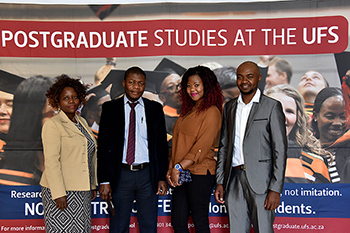Latest News Archive
Please select Category, Year, and then Month to display items
02 January 2025
|
Story Gerda-Marie van Rooyen
|
Photo Supplied
 Leading the research in South Africa is Prof Linus Franke from the Department of Soil, Crop and Climate Sciences.
Leading the research in South Africa is Prof Linus Franke from the Department of Soil, Crop and Climate Sciences.
Scientists are actively pursuing the successful breeding of diploid hybrid potatoes from inbred lines. This is expected to revolutionise potato breeding as it holds the key to rapid genetic progress. It will introduce new varieties for commercialisation through seed. Currently, existing potato variants have a gene that renders self-pollinated seeds infertile.
Prof Linus Franke, an academic in the Department of Soil, Crop and Climate Sciences at the UFS, is leading the research in South Africa. “This technology allows the production of genetically uniform potato seed that is easy to transport and largely disease-free.” He says this differs from conventional breeding whereby only vegetative propagation is possible due to tetraploid varieties in potatoes. It also risks carrying pests and diseases from one generation to the next – leading to the accumulation of pests and diseases with each round of multiplication.
Seed innovation
Prof Franke explains that Solynta BV, a seed company based in the Netherlands that produces potato varieties that can be grown from seed, has included South Africa in their research efforts because it is one of Africa’s largest producers and exporters. Through his academic relationship with Wageningen University and Research, a Dutch institution renowned for its agricultural endeavours and food production, the UFS became involved in researching hybrid potatoes grown from seed.
Diploid seeds containing two sets of chromosomes allow easier gene manipulation to increase predictability and speedier genetic progress. The breeding approach enables the incorporation of tolerance to pests, diseases, abiotic stresses (cold, heat, drought) and other desired genetic traits.
Although Prof Franke is optimistic about this research, he is not blind to disadvantages. “Potato seeds are tiny and have little energy reserves, making it harder to grow potatoes from seed than from tubers.” He says potatoes from seed will take longer to cultivate than tubers, as farmers need to grow plantlets from seeds first, adding six weeks to the growing period. “It is possible that commercial farmers can grow potatoes directly from seed. Alternatively, perhaps more likely, specialised growers will produce tubers of potatoes from seed; these tubers are then sold as seed tubers to other potato farmers, who then continue their normal practices of producing potatoes for the market from tubers.”
Financial benefits
Prof Franke says farmers have reason to get excited. “Seed potatoes will reduce input costs, as varieties with enhanced tolerance to pests and diseases require less pesticides. Planting one hectare of potatoes requires three to four tonnes of potato tubers, but only one 25 g packet of potato seeds.” Since potatoes are a more valuable commodity than maize, this technology might also increase farmers’ income potential.
One, two, three – is your thesis done?
2016-08-26

Winners of the UFS Three-Minute-Thesis competition.
From the left: Thutukile Jita, Natural/Social Sciences
PhD winner; Saheed Sabiu, Natural/Health Sciences
and audience-favourite PhD winner;
Matseliso Mkotywa, master’s audience-favourite
winner; Zingisile Mbo, Natural/Health Sciences
master’s winner.
Photo: Charl Devenish
“Next time you have three minutes to spare, try to formulate your master’s or doctoral thesis,” says Dr Henriëtte van den Berg, Director of the Postgraduate School at the University of the Free State (UFS).
The much anticipated Three-Minute-Thesis (3MT) Competition took place at the UFS Bloemfontein Campus on Friday 19 August 2016. Diverse and interesting research projects were discussed, giving one a glimpse into months and even years of hard work and dedication.
A learning opportunity for candidates
The 3MT competition is an international event founded at the University of Queensland, Australia. It is divided into master’s and PhD categories. At the UFS competition, the master’s section was dominated by the Medical and Natural Sciences, in contrast with the PhD section’s focus on Social Sciences. “The competition is a learning opportunity for our UFS candidates,” says Dr Henriëtte van den Berg.
Thought-provoking research presented
Interesting methodologies and research questions sustained the academic excellence the candidates pride themselves in. Saheed Sabiu, PhD candidate and winner, constructed his thesis around, Waste to Health: Corn silk in the Management of Kidney Diseases. “Use corn silk (white fibre around corn) in the same manner as a tea bag, to help manage kidney diseases,” says Sabiu.
Audience members also had the opportunity to ask the candidates questions relating to their thesis topic.
Winners at the event:
• Master’s winner: Zingisile Mbo
• PhD winner: Natural/ Health Science: Saheed Sabiu
• PhD winner: Natural/Social Sciences: Thutukile Jita
The winners of each category received a cash prize and will represent the UFS at the national 3MT competition, hosted by the UFS in November this year.